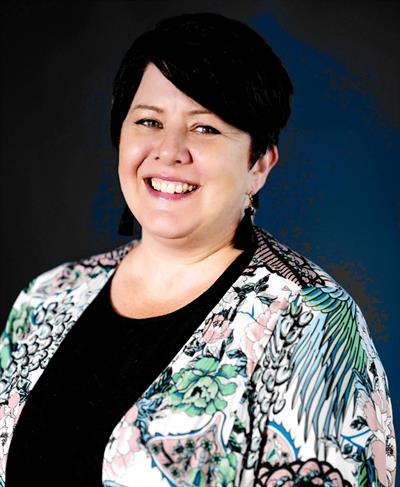- Posted on 5 Jun 2025
- 5-minute read
The transformative power of gender-affirming voice training
At UTS we don’t just teach skills for future careers. We offer students the chance to put those skills into practice in real-world settings for meaningful impacts.
A powerful example of this is the Speech Pathology Reaching Out at UTS (SPROUTS) clinic, part of the Graduate School of Health, where students offer clinical services to children and adults with communication or swallowing support needs.
One of the offerings on the table at the student-led clinic is gender-affirming voice training, a critical yet often inaccessible resource for transgender people.

Free to be me and free to be you.
Free to be US@UTS
A voice that feels like home
We’re judged on our voices in seconds,’ says Dr Cath Gregory, lecturer in Speech Pathology at UTS who supports the gender-affirming voice training through the SPROUTS clinic.
‘That can be a huge source of pain for trans and non-binary people, and it leads to them being treated differently in social situations.
‘You can imagine how hard it is when your voice appears out of step with how you present – when your voice doesn’t align with your appearance, it can lead to misgendering and discrimination. Talking on the phone is a big issue for many of our clients too. That can be a profoundly dysphoric experience.
‘Not everybody feels dysphoria about their voice, but the voice can add to gender dysphoria in a really significant way. That’s why this is so important.’
Unlike many trans men, who undergo a deepening of the voice through testosterone which directly affects the voice box or the larynx, trans women usually don’t experience significant voice changes with hormone therapy. That’s where behavioural voice training can help.
‘Gender-affirming voice training is a lot like singing lessons or accent coaching,’ explains Dr Gregory. ‘We work on pitch, resonance, vocal placement, manipulating all of these different aspects of voice to allow the voice to sound “brighter” and be perceived as more feminine. If that’s what the client wants.’
It’s not about forcing people into gendered boxes. ‘There's no perfect female voice. There's just a voice that you love, that feels like home to you. That’s the motto of our clinic: Love your voice.’
A unique clinical experience
The UTS SPROUTS clinic was launched in 2019 as a student-led program to provide accessible speech pathology services for children and adults around Australia. Adult clients include people with stroke, Parkinson’s disease, and other conditions affecting communication or swallowing. And the gender-affirming voice program offers students something quite rare in speech pathology training.
Savyon, a final-year speech pathology student, recently finished her ten-week placement at the SPROUTS speech pathology clinic.
‘It was an amazing experience,’ she says. ‘The people I worked with were amazing. I feel like I learned so much. It was educational, it was interesting, and it felt impactful. I think the gender-affirming work was one of my favourite parts of the placement.’
‘It was very hands-on – although we were also very heavily supervised, making it a safe space for both us students and the clients. We could learn a lot and do a lot of client-facing practice. Which opened up quite a meaningful and safe space.’
Speech pathology can be deeply emotional as well as technical. For some clients, hearing their own voice played back can be triggering of dysphoria or trauma. So approaching the work with empathy, compassion, and an understanding of each person’s unique journey is part of what students are learning at the SPROUTS clinic.
‘There’s a lot of learning around the sensitivity and the counselling aspect of the job,’ says Savyon. ‘That applies to any client, but the gender-affirming space really opened me up to this aspect, because of how it’s such an intrinsic part of the work. And that was a big part of the training and the support provided.’
Students work in pairs and are supervised by a speech pathologist in their work. In-person sessions often take place in a clinic room equipped with cameras, allowing Cath to step in if needed without disrupting the flow.
‘There's a lot of counselling required in speech pathology as a whole, because anybody that has communication swallowing difficulties – that’s a huge impact on their life. But as we know, for gender affirming clients it may be especially challenging, particularly if they’re navigating mental health issues or have had difficult experiences in the past, that adds additional layers of complexity,’ says Dr Gregory.
The experience also offers students a chance to build their capabilities in a setting that deepens their understanding of diverse experiences.
‘Although speaking can feel so natural to most, when you learn about voice through the lens of diversity you get to see the difficulties and how for some people it can be a very effortful process,’ says Savyon.
‘It made me realise that speaking for me in the way I want to present, effortlessly, is a privilege. It did make me more aware about what people might feel when they want to be perceived a different way than how they may present. It’s not an easy thing to deal with.’
Making gender-affirming voice work mainstream
For many trans people, voice training is one of many expenses along with the medical costs of hormone therapy and potential surgery, plus the outlay for new clothing, makeup, and hair styling. With demand already outpacing supply, affordability becomes an even greater challenge. One of the long-term goals of the SPROUTS clinic is to normalise gender-affirming voice training across the speech pathology profession.
Students are encouraged to take their experience into the workforce and advocate for broader access to gender-affirming voice care.
‘It’s definitely an area I would consider working in if the opportunity arises,’ says Savyon.
‘I had previously done a child placement, and I went into the degree thinking I want to work with children, but after the adult placement I just did, it really opened up the world of adult practice and speech pathology to me.’
‘My hope is that the people who have this experience enjoy it and realise that it's very much within our scope of practise to offer services in gender affirming voice training. With their experience, when these students go out into the workforce, why not put it forward to their practice managers: is there any chance I could offer this as part of your services? It shouldn't be a niche market, it really should be a bread-and-butter thing that most speech pathologists can offer,’ says Cath.
Until then, the SPROUTS clinic continues to offer a powerful dual benefit: empowering students to become well-rounded, compassionate professionals, and giving trans and non-binary clients a voice they can truly call their own.
You can find out more about the UTS speech pathology clinic and any services available, including transgender voice training, by contacting speechpathology.clinic@uts.edu.au. You can find out more about gender affirming voice training from Dr Cath Gregory.







